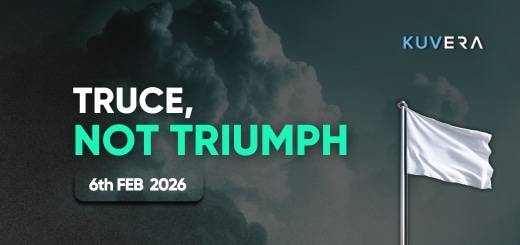In this edition, we talk about the latest controversy surrounding the Adani Group and its billionaire chairman Gautam Adani. We also talk about Facebook and WhatsApp parent Meta’s regulatory woes, SEBI’s new proposals for SME IPOs, and the RBI’s latest assessment of the state of the Indian economy.
Welcome to Kuvera’s weekly digest on the most critical developments related to business, finance, and the markets.
tl;dr Hear the article in brief instead?
If you live in Delhi or anywhere else in the national capital region, or most of North India for that matter, you would have struggled this past week as a toxic smog engulfed the region.
While ordinary citizens gasp for breath and policymakers pass the buck yet again, a smog of a different kind is hanging over the head of India’s second-richest man living thousands of kilometers away from the national capital.
Gautam Adani, the 62-year-old head of the ports-to-power Adani Group, is facing one of the biggest challenges of his life as he was indicted by US prosecutors in a multi-million-dollar bribery and fraud case this week.
Adani is one of eight people accused of paying bribes and defrauding US investors between 2020 and 2024. The other people are his nephew Sagar Adani, former Adani Green Energy CEO Vneet Jaain, two former executives of renewable energy company Azure Power and three former executives of CDPQ, a Canadian firm that owns a majority stake in Azure.
According to the US Department of Justice, Adani and the other accused agreed to pay over Rs 2,029 crore, or about $265 million, in bribes to government officials in India to secure solar power contracts that could yield $2 billion of profit over a 20-year period. The Adani Group then went on to raise more than $3 billion in loans and bonds from US investors.
The large contracts and the fundraising caught the attention of the Securities and Exchange Commission. In early 2022, the SEC launched an investigation into Azure, which was listed on the NYSE at the time but has since delisted. This probe later led the investigators to Adani.
In March 2023, agents of the Federal Bureau of Investigation seized Sagar Adani’s mobile phone and handed him a search warrant. Subsequently, US prosecutors secured a secret grand jury indictment against the eight accused last month and unsealed the indictment this week.
The indictment’s impact was immediate. Adani Green Energy canceled a planned sale of bonds to raise $600 million. Shares of all Adani Group companies plunged, shaving off nearly $30 billion from its market capitalisation. Far away, the Kenyan government cancelled multi-billion-dollar power and airport deals with Adani Group.
So, what happens now?
In its response, Adani Group has said the accusations were “baseless” and that it would seek “legal recourse”.
But the group, which managed to shrug off the allegations of fraud by the US short-seller Hindenburg Research last year, could find it tougher to navigate this crisis given that it involves the FBI and the SEC and not just a stock market operator.
To be sure, it’s unlikely that Adani would surrender in the US or be extradited. Even a trial could be a long way off. Still, these allegations aren’t going away anytime soon.
In the 54-page indictment filed with a US court, the prosecutors cited a WhatsApp message from Sagar Adani discussing the alleged bribery scheme. “The optics are very difficult to cover,” the message read.
Those optics are now impossible to cover and Adani must clear the air at the earliest.
Face the Fines
Adani Group wasn’t the only conglomerate that found itself in the dock this week. Facebook and WhatsApp parent Meta Platforms Inc was another.
The Competition Commission of India (CCI) fined Meta Rs 213 crore over antitrust violations related to the 2021 privacy policy of messaging app WhatsApp, which allowed data sharing with Facebook and other units.
The regulator, which started a probe into WhatsApp’s privacy policy in March 2021, also ordered the messaging app to stop sharing user data for advertising purposes with other applications owned by Meta for five years.
“Sharing of user data collected on WhatsApp with other Meta companies… for purposes other than for providing WhatsApp service shall not be made a condition for users to access WhatsApp Service in India,” the CCI said.
On its part, Meta said it disagreed with the order and that it would challenge the CCI’s decision.
While the CCI’s fine might be peanuts for a company the size of Meta, the tech giant was slapped with a bigger penalty in Europe this week.
The European Commission, the executive arm of the European Union, imposed a fine of €798 million, or about $840 million, on Meta over abusive practices that allegedly benefitted its online classified ads service Facebook Marketplace.
The commission said that Meta breached the EU’s rules by tying Facebook Marketplace to its social network Facebook and by imposing unfair trading conditions on other online classified ads providers.
Again, Meta said it would appeal the decision. In the meantime, however, it will comply with the EU ruling.
Small Issues, Big Worries
While the CCI is going after a tech giant, the Securities and Exchange Board of India has trained its guns on small and medium-sized enterprises (SMEs) seeking to float initial public offerings.
The capital markets regulator this week proposed tighter rules for SME IPOs to address concerns that the SME platform of stock exchanges was being misused.
What prompted SEBI to make these proposals?
SME IPOs have surged over the past couple of years. SMEs had raised about Rs 6,000 crore via IPOs in the last financial year. In the current fiscal year till Oct. 15, more than 159 SMEs have raised Rs 5,700 crore through such IPOs. Many of these IPOs saw subscription of as much as 500 to 1,000 times.
SEBI said that it was important to review the rules governing SME IPOs given the surge and the risk of diversion of funds.
So, what exactly has SEBI proposed?
In a consultation paper seeking public comments by Dec. 4, SEBI said the minimum size of an SME IPO should be Rs 10 crore since companies can raise smaller amounts through alternative sources. It also proposed to double the minimum application size for the SME IPOs to Rs 2 lakh.
In addition, it suggested that only those SMEs can file for IPOs that recorded an operating profit of Rs 3 crore in at least two of the three financial years before submitting the application. In another proposal aimed at ensuring that such IPOs don’t just involve SME owners offloading their stakes at high valuations to public market investors, SEBI suggested that the offer for sale portion should be capped at 20% of the total issue size.
Will SEBI’s proposals, as and when they do come into effect, calm down the euphoria in the SME market? Watch this space!
Bullish Outlook
Moving on to some economic news, the Reserve Bank of India this week said it expected GDP growth to pick up in the October-December quarter thanks to a rise in private consumption during the festival season.
In its monthly bulletin for November, the central bank projected third-quarter GDP growth at 7.6%. That would be faster than an estimated 6.7% growth in the second quarter.
“In India, the slack in speed observed in the second quarter of 2024-25 is behind us as private consumption is back to being the driver of domestic demand with festival spending lighting up real activity in Q3,” the RBI said.
Monsoon rainfall had affected private consumption in the July-September quarter, dragging earnings growth of many Indian companies. The RBI’s optimism that consumption was rebounding would bode well of these companies.
On the flip side, the RBI noted that headline inflation rose above the upper tolerance band of 6% in October 2024 due to a surge in food prices and an increase in core inflation.
Still, it said the medium-term outlook for the economy “remains bullish as the innate strength of the macro-fundamentals reasserts itself”.
Market Wrap
Indian stock markets looked set to record another loss-making week until Thursday but a spectacular global rally on Friday propelled the benchmark indices higher.
The 30-stock Sensex ended the holiday-shortened week—the markets were closed for state elections on Wednesday—with gains of about 1.6%. However, the 50-stock Nifty managed to close only about 1.1% higher, with gains in the index capped by heavy losses in Adani Group counters.
Adani Enterprises lost more than a fifth of its value while Adani Ports slumped nearly 10%. Other major stocks that were a drag on the Nifty included SBI Life Insurance, Bajaj Finserv and IndusInd Bank. State-run energy companies ONGC, BPCL and NTPC also ended in the red, as did drugmakers Cipla and Dr Reddy’s Labs.
The winners were led by state-run Power Grid Corp and automakers Mahindra & Mahindra and Hero MotoCorp. Aditya Birla Group companies UltraTech Cement, Hindalco and Grasim were among the major gainers, as were steelmakers JSW and Tata Steel. Kotak Mahindra Bank, HDFC Bank, Nestle, Hindustan Unilever and Trent also ended in the green.
IT companies Tech Mahindra, TCS, Infosys, HCL Tech, and Wipro continued to rise this week as the rupee weakened below 84.50 to a dollar for the first time, boosting expectations it will benefit software services exports.
Other Headlines
- Adani Infra to buy 30% stake in PSP Projects for Rs 685 crore, to launch open offer.
- NTPC Green Energy’s Rs 10,000-crore IPO fully covered.
- Govt studying request to impose temporary tax on China steel imports, says JSW chairman Sajjan Jindal.
- Nokia says it got “multi-billion” dollar contract from Bharti Airtel for delivery of 4G and 5G equipment.
- SoftBank-backed OfBusiness hires five banks including Axis, JPMorgan, Citi for IPO next year.
- Aegis Vopak files draft prospectus for Rs 3,500 crore IPO with SEBI.
- News agency ANI sues ChatGPT creator OpenAI for using content without permission in AI training.
- Luxury hotel chain Hilton to expand India presence, signs licensing pact with Embassy Group.
- Taj Hotels owner Indian Hotels plans Rs 5,000-crore capex over five years to double hotel count.
- US President-elect Donald Trump’s pro-business policies to benefit Indian IT sector, says Wipro’s Rishad Premji.
- Govt plans to cut stake in Central Bank of India, Indian Overseas Bank, UCO Bank, and Punjab and Sind Bank.
- Govt may extend RBI governor Shaktikanta Das’ term for second time, reports Reuters.
That’s all for this week. Until next week, happy investing!
Interested in how we think about the markets?
Read more: Zen And The Art Of Investing
Watch here: Investing in International Markets
Start investing through a platform that brings goal planning and investing to your fingertips. Visit kuvera.in to discover Direct Plans and Fixed Deposits and start investing today. #MutualFundSahiHai #KuveraSabseSahiHai












